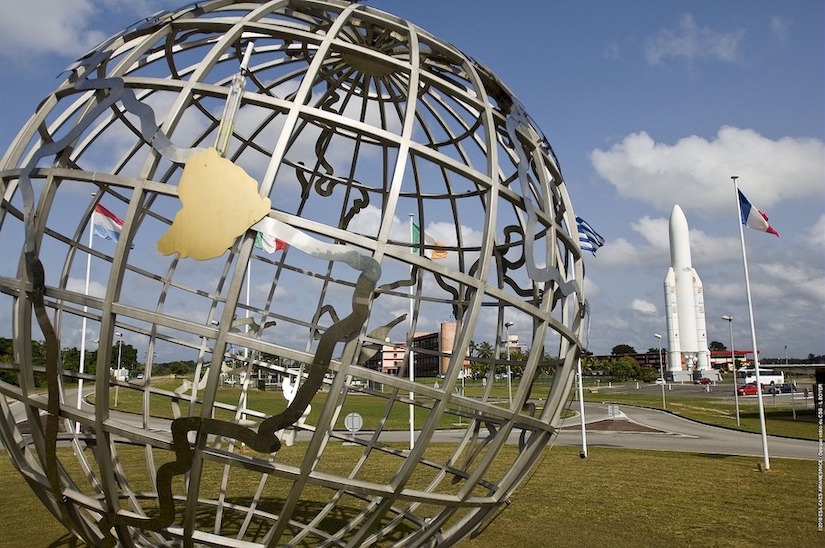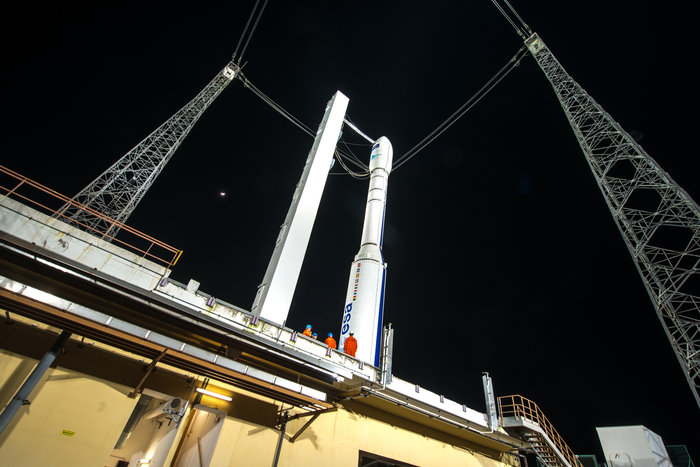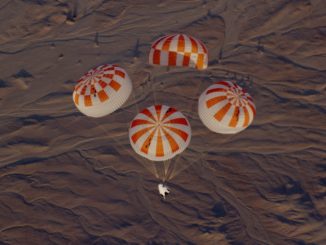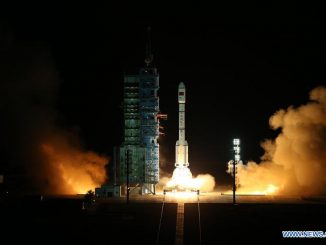
Targeting a pair of satellite launches in June and July, ground teams will resume work at the Guiana Space Center in South America next week after a nearly two-month pause in Arianespace’s launch campaigns due to the coronavirus pandemic.
Arianespace said engineers and technicians will start the “gradual resumption” of launch activities Monday, in line with measures introduced by the French government to allow for the loosening of a strict lockdown that halted much of the country’s business operations.
The initial launch preparation activities in French Guiana — an overseas department of France — will focus on readying an Italian-built Vega launcher for liftoff in mid-June on a rideshare mission carrying approximately 50 small satellites into orbit.
The Vega launch was previously scheduled for March 23, but officials ordered a halt to launch preparations in mid-March as the coronavirus pandemic swept across Europe and threatened the population in French Guiana.
The next flight of the Vega rocket will be the solid-fueled launcher’s first mission since last July, when a malfunction on the rocket’s second stage led to the vehicle’s destruction and the loss of a military spy satellite owned by the United Arab Emirates. It will be the 16th flight overall by a Vega rocket since February 2012.
A dual-payload mission using Europe’s heavy-duty Ariane 5 rocket is scheduled for liftoff at the end of July carrying large geostationary communications satellites for Intelsat and the Japanese operator B-SAT, Arianespace said.
“All of these campaigns will be carried out in strict compliance with the health rules published by the Prefect of French Guiana, as well as the French CNES space agency and the Guiana Space Center,” Arianespace said. “The objective is to preserve the health of launch site workers and those who are deployed to the space center, as well as the local population — all while ensuring the security and safety conditions required for preparation of the planned launches.”

Stephane Israel, Arianespace’s CEO, said in a video interview with Via Satellite magazine that the level of infection with the COVID-19 viral disease is “very, very, very low.”
Israel said teams from France, Italy and other parts of Europe will travel back to French Guiana early next week. They will pick up where technicians left off in the Vega launch campaign in March, which was put on hold after most of the rocket was already assembled on its launch pad.
Security forces and a minimum staff remained at the spaceport to maintain the readiness of the center’s infrastructure and the safety of rocket and satellite hardware.
“In the Guiana Space Center, we have reorganized when we are working,” Israel told Via Satellite. “When it’s not possible to respect social distancing, then we have masks to protect ourselves and to protect our teams.”
ArianeGroup, Arianespace’s parent company, has continued some work inside rocket factories in Europe. The company assembles Ariane 5 and Ariane 6 engines and tanks at sites in France and Germany, and the work flow at ArianeGroup is now operating at about 70 percent capacity, Israel said.
“We’ll see how this period is going to last,” he told Via Satellite. “We know that we are going to work for months in a very special way. We will have to respect social distancing, where we travel far less.”
In the near-term, launches from French Guiana will occur with only essential personnel present. Israel said Arianespace is looking at ways to modify the way it broadcasts its launches to include more remote participation from customers unable to travel to French Guiana and attend the launch in person.
At the time of the pause in launch processing in March, two launches using Russian-made Soyuz rockets were scheduled to take off in April and May with the UAE military’s Falcon Eye 2 Earth-imaging satellite and the French government’s CSO 2 spy satellite.
Those missions are now scheduled to launch later this year, with Russian teams due to resume Soyuz launch preps this summer, Arianespace said.
Email the author.
Follow Stephen Clark on Twitter: @StephenClark1.



